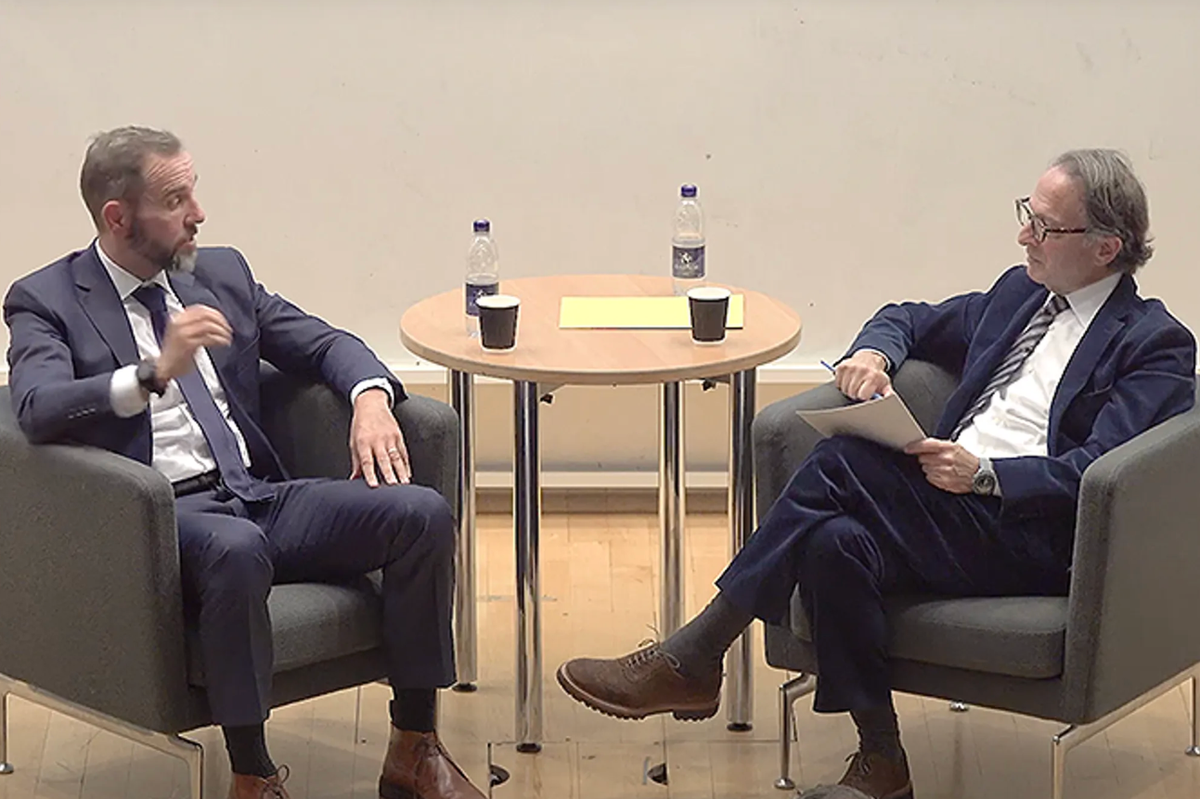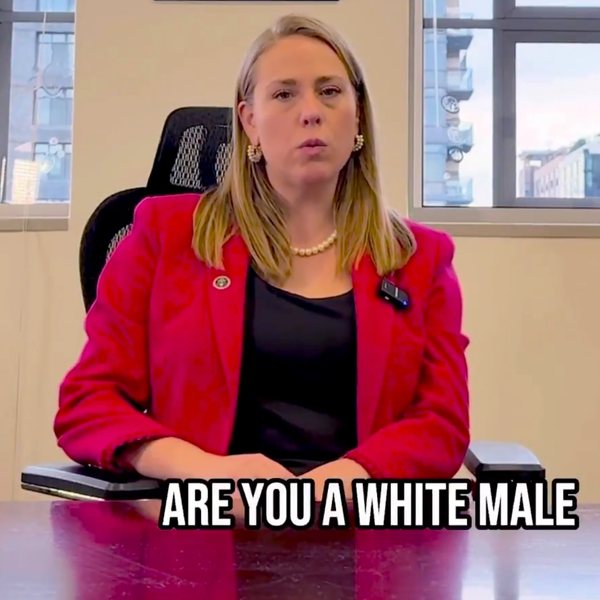Former Special Counsel Slaps Back At Trump Gang's 'Ludicrous' Accusations

Former Special Counsel Jack and former FBI general counsel Andrew Weissman
Last week brought the sighting of an endangered species—the professional federal prosecutor. After months out of view, former special counsel Jack Smith reappeared in a public interview in the U.K.
His conversation with fellow DOJ alum Andrew Weissmann came just as the Department has descended into rank betrayal of its own creed—justice without fear or favor, or politics. The recent indictments of Jim Comey and Letitia James, and reports that a grand jury is expected to indict John Bolton, leave little doubt that a once-honorable agency has fallen into a cesspool, with no credible path back so long as Trump is president.
It also followed on a ridiculous performance at an oversight hearing by Pam Bondi, who was perfectly nonresponsive and dripping with contempt—and came amid the House Judiciary Committee’s preparations under Chair Jim Jordan to subpoena Smith to testify in closed session.
That may help explain why Smith chose this moment to break his post-DOJ silence, knowing—as he must—that he is about to enter a sinister hall of mirrors, facing hostile Trump allies eager to mangle his words to fit into pre-formed talking points.
Bondi, Jordan, Trump, and others in Trump’s circle have been chanting the same mantra as if repetition could make it true: that the Biden administration “weaponized” the Department of Justice and that Trump has somehow re-righted the ship of justice.
Weissmann teed up that charge directly, and with quiet composure and a slightly raised voice, Smith gave his answer in a single word: “ludicrous.”
The charge is indeed ludicrous—but it’s also far worse. For DOJ veterans who know how the place has long operated, watching the wrecking ball that Bondi, Bove, Blanche, and company have swung through it over these past eight months is heartbreaking.
There’s a simple way to test their slanderous claims: the twin pillars of federal prosecution—the law and the facts. With limited nuance, a righteous case is one where it both establishes guilt and makes conviction reasonably likely.
That was true, for instance, of Mayor Eric Adams of New York City. Bove’s insistence that the Department lie and dismiss the case prompted the resignations of the Manhattan U.S. Attorney, the lead prosecutor, and at least three top supervisory officials in the DOJ’s Public Integrity Section. Once considered the crown jewel of the DOJ, the section has been gutted to the point where only two of the 30 prosecutors there when Trump took office remain.
That corrupt command foreshadowed what was to come. It’s unjust to abandon a righteous case, but as the adage goes, better ten guilty go free than one innocent be convicted.
Which is exactly where we are now. Trump’s DOJ brings cases against his enemies because they are his enemies. It’s the ultimate corruption—prosecutions as political reprisal, debasing American justice to the level of authoritarian regimes.
This isn’t a judgment call; it’s an iron fact. A recent survey by Emily Bazelon and Rick Hasen of fifty top D.C. lawyers—many former DOJ officials, Republicans and Democrats alike—found unanimous agreement: Trump and Bondi are using the Department to target political foes and reward allies.
That brings us back to Bondi and company. They shout that the Biden DOJ was weaponized, but are unable to point to a single prosecution unsupported by law and fact. And that’s because there wasn’t one. They may grumble and wave in the direction of the January 6 or Russia interference prosecutions, but apart from the identity of the defendants (which cuts the other way), those prosecutions plainly were handled with the care and professionalism that was once the unspoken standard of the DOJ. As Jack Smith reminded us—by word and bearing—that was the Department’s inviolable ethos.
The only thing behind their cynical claim is the identity of the defendants, starting with Trump. But justice without fear or favor not only permits but requires applying the law equally to rich and poor alike; it’s part of every prosecutor’s oath.
Nor do you have to have unquestioned faith in the pre-Trump DOJ to see the patent falsity—in a word, the ludicrousness—of the Republican attack-squad claims. We all watched the events that gave rise to the first U.S.A. v. Trump on January 6. The necessary implication of the weaponization line is that the DOJ and FBI should have watched the marauders’ brutality toward police officers and crazed efforts to stop the vote counting and decided to do nothing.
Herein lies the righteous fury of DOJ alumni. Trump’s repetition and vitriol are an effort to induce national amnesia about his crimes after losing the election. We have to remember clearly—and remind others—that Smith’s prosecutions, including Mar-a-Lago, were the opposite of weaponized: a massive, principled effort in defense of the Republic. The investigation of senators’ phone records, now smeared as “spying,” was a lawful, orthodox step to reconstruct the evidence of that woeful day.
Smith’s remarks, and the Department’s vilification of him, pose the question that should haunt us: What if DOJ had done nothing in response to the insurrection? Imagine the message—“Move along. Nothing to see here.” The outrage would have been national, and rightly so. We saw the insurrection with our own eyes. Refusing to prosecute it would have been a betrayal of the Constitution itself.
And it’s even more offensive to pair that false “weaponization” claim with the notion that Trump’s DOJ is now “by the book,” when it has discarded the Principles of Federal Prosecution and aligned with the priorities outlined in Project 2025.
It’s pure Orwell: truth is fiction.
The lies about his cases are only the beginning of the vicious treatment Smith has had to endure. He and Weissmann talked about the purging of his whole team—the hand-picked best of the best—for the sole reason that they worked with him. As he was throughout, Smith was unruffled and dignified; he praised the team to the stars and expressed confidence it would work out for everyone. But it has to be a particular sort of pain to see your loyal cadre vilified and forced out of government and not to be able to do anything about it.
In any legitimate legal system, bringing a case for political reasons would be a fireable offense. In Trump’s DOJ, refusing to is.
For those of us who’ve worked inside the Department of Justice, seeing Smith was like glimpsing a visitor from a lost world where the moral compass of federal prosecution still pointed due north.
What struck me most in his remarks wasn’t the content. Former DOJ’ers could have written his talking points in advance. It was his bearing—his quiet assurance that justice must remain separate from politics and that, in the DOJ to which he dedicated much of his professional life, it did.
Contrast that calm composure with Bondi’s histrionics at the oversight hearing. If you played both tapes side by side with the sound off, it would be apparent who was telling it straight and who wasn’t.
That’s why Smith’s tone—precise, almost understated—was so affecting. He wasn’t defending himself so much as defending what it means to be a federal prosecutor. Every sentence reaffirmed the moral geometry of the old DOJ: dispassionate evaluation of evidence, respect for institutional guardrails, modesty before the awesome power of the state. He might as well have been reading from the Department’s handbook—except that the handbook has now been burned.
It was poignant to watch him speak so quietly about truths so obvious. But it was also clarifying. The battle for the DOJ’s soul is no longer theoretical. It’s happening in real time, and the forces of good are getting swamped.
For now, corrupt hands hold the reins at the Department of Justice. Unconstitutional conduct—beginning with reprisal prosecutions—is the modus operandi of federal law enforcement. But even during what we can hope is a temporary suspension of justice without fear or favor, we must call out Trump’s perversion of the Department while defending the integrity of the institution he inherited. If Trump’s Orwellian characterization of the Department’s history gains purchase, the rule of law itself becomes the fiction.
The current DOJ’s version of justice is an inversion of everything the Department once stood for—and unless we confront it head-on at every turn, ludicrous will soon feel far too gentle a word.
Harry Litman is a former United States Attorney and the executive producer and host of the Talking Feds podcast. He has taught law at UCLA, Berkeley, and Georgetown and served as a deputy assistant attorney general in the Clinton Administration. Please consider subscribing to Talking Feds on Substack.
Reprinted with permission from Talking Feds.








